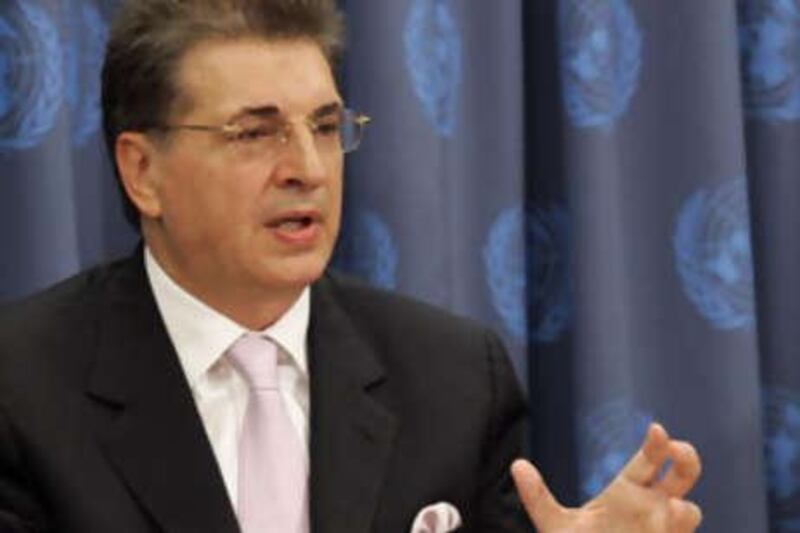UNITED NATIONS // A top UN official has stepped into the disagreement between the world body and the Government in relation to exactly what the UAE's aid figures are. During his official visit to the UAE, Srgjan Kerim, the president of the UN General Assembly, tackled the issue of the Government's contributions to war-torn, disaster-struck and developing nations. Mr Kerim's meeting with Dr Anwar Mohammed Gargash, the Minister of State for Foreign Affairs, on Sunday, addressed claims by Sir John Holmes, the UN humanitarian chief, that the UAE presented "highly dubious" aid figures during a speech to world leaders.
"Yes, we discussed it. Indeed he [Dr Gargash] raised it," said Mr Kerim. "And I promised to him that I will talk with under secretary Holmes, and I have convened already a meeting with him on Friday to start a discussion to see whether there are some methodological issues and what is the cause of the problem. "I think it was a very good, comprehensive discussion and I believe with such a constructive approach we can also resolve this problem, which I don't think should be in the forefront when it comes to the analysis or evaluation of the relations between the UAE and the UN."
The row erupted in April, when Dr Maitha al Shamsi, the Minister of State, told the UN General Assembly in New York that the UAE donated 3.6 per cent of its gross national product (GNP) to overseas assistance. Based on a US$163 billion (Dh598bn) estimate of GNP, this would mean the Emirates gives away an impressive US$5.87bn in aid and assistance to struggling nations. The figure surprised many delegates to the 192-member body because it is proportionally several times greater than the aid packages pledged by established donor countries such as Denmark, Norway and Sweden.
Dr Shamsi's figure is more than five times larger than the 0.7 per cent share of GNP that a handful of developed nations have agreed upon as the benchmark quantity of overseas development assistance. Sir John later told The National that the Government's 3.6 per cent figure appeared to be massively inflated, saying "there doesn't seem to be those vast sums of money flowing that I have seen". The allegations were echoed by Abdul Haq Amiri, the head of the UN's Office for the Co-ordination of Humanitarian Affairs (Ocha) in Dubai, who described Dr Shamsi's figure as "extremely high" and called for "more visibility and more transparency" from the Government.
The UAE has stood by the figure, with Ahmed al Jarman, the UN Ambassador, promising that officials in Abu Dhabi are compiling a report and will "give a specific answer" in due course. The National has made several attempts to contact Dr Shamsi for comment by telephone and e-mail, but has been told by colleagues that the minister is "not presently available to respond". The Government's website, UAE Interact, describes massive overseas spending in disaster-struck and developing parts of Africa and Asia, saying "part of the country's wealth from oil and gas should be devoted to helping other countries that have been less well-endowed".
This week, Sheikh Hamdan bin Zayed, the Deputy Prime Minister and Chairman of the UAE Red Crescent Authority, announced the creation of an External Aid Liaison Bureau to co-ordinate all humanitarian assistance being provided by the UAE's various charities and agencies. Sheikh Hamdan said the bureau would liaise with bodies such as Ocha and document the country's aid donations - and would thus be able to substantiate figures such as Dr Shamsi's 3.6 per cent claim.
In his first statement on UAE aid donations since the original allegation, Sir John said he hoped the Government's new aid bureau would be "in line with international standards of accountability and transparency". "We are hopeful that it will vastly improve the flow of information about the quantity and destination of assistance coming from the UAE and the level of co-ordination with the international community on key issues," said Sir John.
@Email:jreinl@thenational.ae







